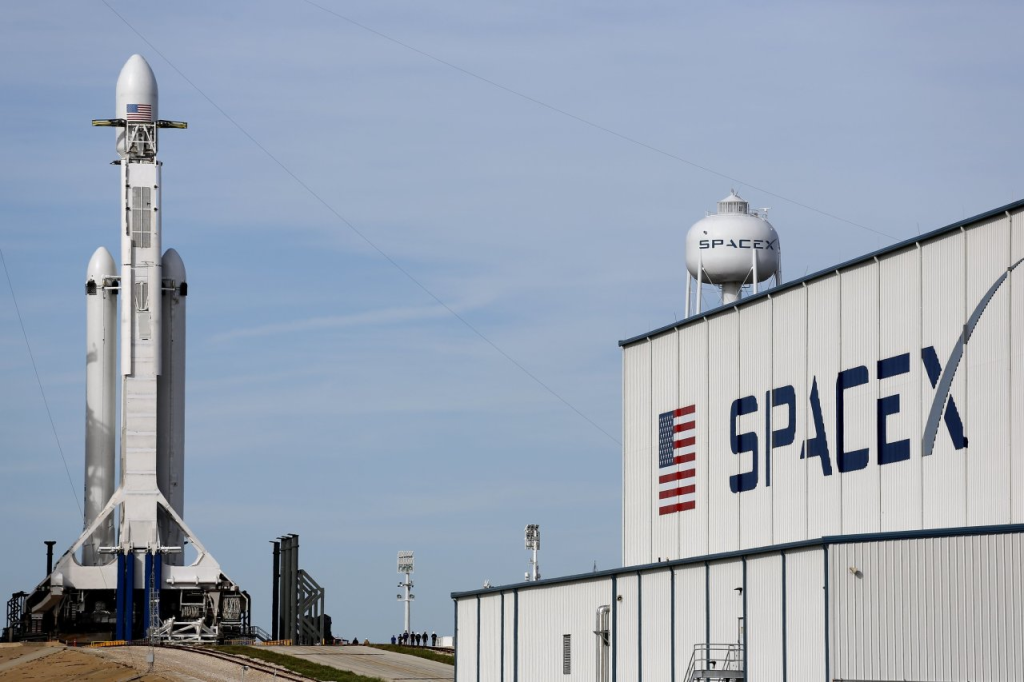
Elon Musk, the maverick billionaire, space enthusiast, and unrivaled showman of the modern tech age, has once again shaken the foundations of reality with a jaw-dropping announcement: he will personally stream the landing of SpaceX rockets — not just once or twice, but a staggering eight trillion times, making it the largest digital broadcast initiative in human history.The statement, which arrived as a single, casually dropped message on his X (formerly Twitter) account, read: “Streaming every rocket landing. All 8,000,000,000,000 of them. LIVE. Don’t blink.” With those few words, Musk has once again blurred the line between what’s possible, what’s plausible, and what’s probably just another moonshot vision only he dares to dream aloud.But while the literal feasibility of streaming eight trillion landings is debatable (and perhaps irrelevant in the hyperbole-laced world Musk thrives in), the deeper implications of this move are no less seismic. This isn’t just about rockets.

This is about Musk asserting his dominance over the digital age, space age, and media age — all at once.For years, SpaceX has been steadily chipping away at the impossible. From its humble beginnings — when most experts laughed off the idea that a private company could succeed where nations had struggled — to its triumphant reusable rocket landings, the company has grown into the undisputed leader in commercial spaceflight.SpaceX now launches more payloads into orbit than any other organization on Earth. It has launched satellites, space station cargo, Starlink fleets, and even tourists. But perhaps its most underrated weapon has been its visual storytelling.From high-definition drone footage of booster landings to cinematic clips of Falcon Heavy launches with Earth in the background, SpaceX has always understood the emotional power of spectacle. Now, Musk intends to dial that spectacle to 11 — or more precisely, to 8,000,000,000,000.The decision to live-stream every rocket landing — on a scale unprecedented and borderline metaphysical — is classic Elon Musk: part ambition, part provocation, and entirely engineered for virality. Critics immediately rushed to mock the announcement. “There aren’t even that many seconds in the history of the universe,” one wrote.Others pointed out the technological impossibility, logistical absurdity, and environmental implications of launching that many rockets. But Musk, ever the provocateur, likely doesn’t care. His goal isn’t statistical accuracy; it’s conceptual shock.He wants the world to understand that what SpaceX is building is not a launch company. It’s a launch platform — not just of rockets, but of ideas, philosophies, and the redefinition of human potential.By framing the livestream as the central product, Musk is doing something revolutionary: turning rocket science into real-time entertainment. While past generations grew up on televised moon landings and science documentaries, Musk is creating an always-on space reality channel — one where rockets rise, fall, land, and relaunch in an infinite loop of awe and inspiration.With eight trillion streams, even if exaggerated, Musk is communicating something profound — that the future of space will not just be witnessed by the privileged few, but experienced by all.

In his mind, space is not a destination for the elite; it’s the next frontier for collective human consciousness.This isn’t Musk’s first foray into mass livestreaming. In the past, he’s personally narrated SpaceX missions, dropped in on Tesla reveals, and transformed product unveilings into full-blown cultural events.But this latest move goes far beyond marketing. It represents a philosophical pivot — a declaration that the landing of rockets is no longer news, but routine. And by making that routine globally visible, Musk is reshaping how the public engages with space exploration.It’s not just about science anymore. It’s about spectacle, identity, and ownership. When you watch a rocket land live — especially one you’ve seen before — you feel part of something. You feel like a co-pilot of civilization.And that, perhaps, is the genius behind the hyperbole. By invoking “8 trillion rocket landings,” Musk is suggesting a future in which spaceflight is as common as air travel, as mundane as logging onto the internet.It’s a metaphor for scale — a vision of rockets not as rare events, but as tools of daily life. This aligns perfectly with his long-term mission: to make humanity a multiplanetary species.In Musk’s utopia, rockets will launch every few minutes, carrying cargo, passengers, materials, and code between planets. They’ll refuel in orbit, bounce off lunar bases, and touch down on Mars with such frequency that today’s awe will become tomorrow’s norm.But there’s also a deeper layer to Musk’s move: control of the narrative. In an era where legacy media often criticizes him and where traditional channels no longer dominate public perception, Musk is taking matters into his own hands. With X under his ownership, he now controls not just the rockets but the message.Every livestream, every camera angle, every pixel of booster smoke becomes part of his curated mythos. He doesn’t need CNN or BBC. He is the broadcaster, the director, and the subject. By making SpaceX rocket landings the most streamed events in history, Musk turns X into a global launchpad — not just for ideas, but for influence.There’s also the technical side. SpaceX already boasts one of the most advanced video streaming setups in aerospace history. Their camera systems — mounted on drone ships, rockets, and tracking towers — provide near-cinematic quality visuals of launches and landings. With Starlink, Musk has the perfect backbone for global livestreaming.Low latency, high bandwidth internet beamed from orbit means that even the most remote regions on Earth could soon have access to real-time spaceflight. Imagine students in rural Africa watching a Falcon 9 booster land with the same clarity and speed as a boardroom in Silicon Valley. This is not just entertainment. It’s education. It’s empowerment.Of course, the idea of 8 trillion rocket landings is absurd by any literal standard. To conduct that many missions, even launching one rocket every second would take over 253,000 years. The energy requirements, material logistics, and planetary environmental impact would be incalculable.

But that’s the point. Musk isn’t offering a number; he’s offering a mindset.Just as he once said, “I want to die on Mars — just not on impact,” or claimed that Tesla could one day be worth more than Apple and Saudi Aramco combined, the goal is to stretch the limits of belief. To shock the imagination into motion. To push the envelope until the envelope becomes a starship.Already, the announcement has sent waves across the internet. Influencers are lining up to co-stream the landings. NASA astronauts have chimed in with curiosity and excitement. Competing launch companies are scrambling to understand the PR implications.And behind it all, Musk sits — a master of narrative manipulation, a billionaire who understands that in the modern age, belief is more powerful than balance sheets. For him, a trillion streams is no different than a trillion dollars — it’s about dominance, attention, and the gravitational pull of boldness.What happens next? In all likelihood, SpaceX will ramp up its launch cadence even further. Starship — Musk’s massive next-gen rocket — is being readied for rapid reuse. The FAA and global regulators are watching closely.And millions, if not billions, will soon be able to tune in to see what once was the domain of science fiction play out in their pockets, in high resolution, with Musk narrating over the hum of retro-futurist synth music. It will be ridiculous. It will be beautiful. It will be unmistakably Musk.In the end, the number is irrelevant. Whether Musk streams eight rockets or eight trillion, what matters is the audacity of the promise. In a world where dreams are often tempered by feasibility, Musk continues to be a walking paradox: grounded in physics, fueled by fantasy.His message to humanity remains clear — don’t aim for the sky. Aim for the stars. And don’t just imagine it — stream it.


